新概念英语第一册83-84课课件60897教学文稿
新概念一Lesson 83-84 ppt课件
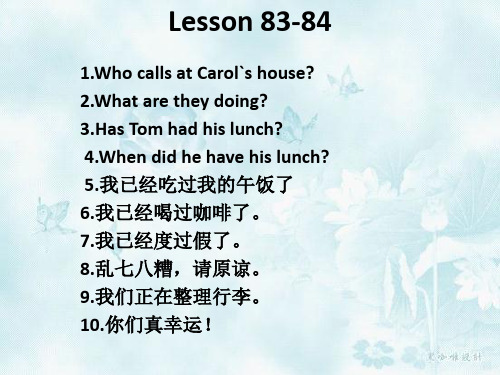
电影
film n.胶卷,底片
Please give me a roll of film. 请给我一卷胶卷。
film v.拍电影
I have filmed . 我拍过电影。
★ beautiful adj.
adj. 美丽的,漂亮的
a beautiful flower 美丽的花 a beautiful woman 美丽的女人
★cinema n.电影院
cinthe cinema tomorrow.(movie theater <美语>电影院) 明天我们打算去电影院。
film n.电影
a film star 电影明星
see the film 看电影
make a film拍
London 伦敦
Tokyo 东京
Washington 华盛顿 Sydney 悉尼
巴黎凯旋门
(Triumphal Arch [trai'Λmfel a:k])
• 凯旋门坐落在巴黎西北面的戴高乐 广场,12条大街以它为中心放射形 散开,因此,戴高乐广场也称星际广 场。 凯旋门的建造,始于古罗马。 1806年2月22日,拿破仑一世在欧斯 代尔利茨战役中打败了奥俄联军, 凯旋回国,经过星际广场,在国民的 欢呼声中,...
Lesson 83-84
1.Who calls at Carol`s house? 2.What are they doing? 3.Has Tom had his lunch? 4.When did he have his lunch? 5.我已经吃过我的午饭了 6.我已经喝过咖啡了。 7.我已经度过假了。 8.乱七八糟,请原谅。 9.我们正在整理行李。 10.你们真幸运!
新概念英语第一册Lessons83-84课件

• 每日一笑
Dragon born dragon , chicken born chicken , mouse’s son can make hole !
• 每日一笑
If you want money , I have no.
If you want life , I have one .
at 4 o’clock.
Would you like some ice-creams?
No, thanks. I’ve had an icecream. I had an ice-cream at four o’clock.
I’ve already had some/ one... I haven’t / She hasn’t had any ... Have you had any…?
2021/8/23
(2) n. 背包,行李包
Her pack is cute.
2021/8/23
★ suitcase [ˈsu:tkeɪs] n.手提箱
2021/8/23
★ already [ɔ:lˈredi] adv.已经
I have had lunch already. 我已经吃完午饭了。
2.have lunch with sb. 和某人一起吃午饭
We're having lunch with John today. 我们今天和约翰一起共进午餐。
Have you had…? 你已经...了吗?
Read the 2 stories:
<Ⅰ>
He had a piece of pizza at 5 o’clock. He is full.
I had at half past twelve. CAROL:Have a cup of coffee then. SAM:I've just had a cup, thank you. I had one after my lunch. TOM: Let's go into the living room, Carol.
新概念第一册教案Lesson83-84.docx
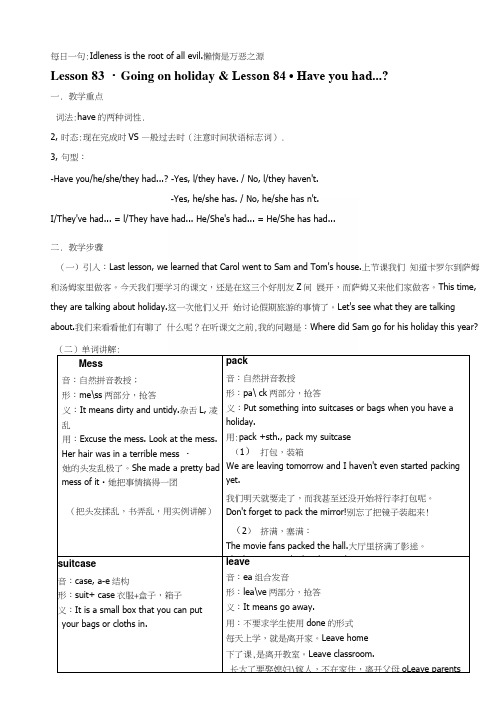
每日一句:Idleness is the root of all evil.懒惰是万恶之源Lesson 83 ・ Going on holiday & Lesson 84 • Have you had...?一.教学重点词法:have的两种词性.2,时态:现在完成时VS —般过去时(注意时间状语标志词).3,句型:-Have you/he/she/they had...? -Yes, l/they have. / No, l/they haven't.-Yes, he/she has. / No, he/she has n't.I/They've had... = l/They have had... He/She's had... = He/She has had...二.教学步骤(一)引入:Last lesson, we learned that Carol went to Sam and Tom's house.上节课我们知道卡罗尔到萨姆和汤姆家里做客。
今天我们要学习的课文,还是在这三个好刖友Z间展开,而萨姆又来他们家做客。
This time, they are talking about holiday.这一次他们乂开始讨论假期旅游的事情了。
Let's see what they are talking about.我们来看看他们有聊了什么呢?在听课文之前,我的问题是:Where did Sam go for his holiday this year? (二)单词讲解:Mess音:自然拼音教授;形:me\ss两部分,抢答义:It means dirty and untidy.杂舌L, 凌乱用:Excuse the mess. Look at the mess. Her hair was in a terrible mess ・她的头发乱极了。
新概念英语NCE_Lesson83-84(共30页)课件
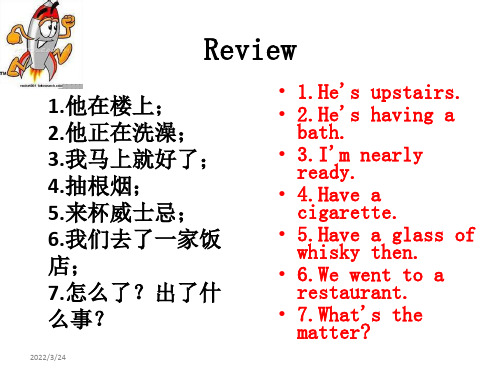
What’s your holiday plan?
Huang shan
Shang hai
Inner Mongolia
Lesson 83 Going on holiday
• Q1:How can you go there? • Q2:What things can you take? • Q3:What do you want to buy on holiday?
cigarette. • 5.Have a glass of
whisky then. • 6.We went to a
restaurant. • 7.What's the
matter?
• 1. Have实义动词 • 吃早饭 • have breakfast
• 抽根烟 • have a cigarette
2022/3/24
Retell the story.
现在完成时
• 基本结构:主语+has/have +过去分词 • 否定形式:主语+hasn’t/ haven’t +过去分词 • 疑问句:has/ have 提前 • Eg:我吃过早饭了 • I have had breakfast.
动词的过去分词的规则变化
I've already had my holiday this year. CAROL:Where did you go? SAM: I stayed at home!
Listen to the tape again.
• Listen to the tape again. Pay attention to the new words and expressions. Try to remerber the text. Follow it ,please.
新概念英语NCE_Lesson83-84(共20页)课件

单词学习
• mess /mes/ n. 杂乱,凌乱 • pack/pæ k/ v.包装,打包,装箱 • suitcase/'sju:tkeis/
n. 手提箱 • leave/li:v/ v. 离开 • already/a:l'redi/
adv. 已经
★mess n. 杂乱,凌乱 • 乱七八糟,请原谅。 • Excuse the mess. • The room is in a mess. • 那个房间乱七八糟
• We’re going to leave tomorrow. • = We’re leaving tomorrow. • 当动词是leave, go, come, arrive等时,
可以用现在进行时表将来。
• I’m cominght.
• I have had breakfast. • 我没吃早饭呢。
• I haven’t had breakfast. • 你吃早饭了吗?
• Have you had breakfast?
现在完成时态练习题
• 1.We __ just____-(talk) about you. • 2.______you _____(visit) the Great
• 清理散乱的东西 • clear up the mess • He was such a mess that he did not
know what to do. • 他心乱得不知如何是好
★pack v. 包装,打包,装箱 ① v. 打包,装箱
• pack one’s suitcase 打包 • pack one’s suitcases 收拾行李。
Wall yet? • 3.How long have you ______(teach)
新概念英语第一册Lesson 83-84课件!

Open your book and finish Part B of page 172.
Let's listen to the tape.
Grammar: The Present Perfect:现在完成进行时态
1、含义 (1)在过去一个不确定的时间里发生,并与现在有着某种联系 的动作 (2)开始于过去并持续到现在的动作。 2、构成 肯定句: has/have + 动词的过去分词 否定形式:hasn't/haven't + 动词的过去分词 疑问形式:把 has/have 提前 我已经吃过早饭了。 I have had breakfast. 我没吃早饭呢。 I haven’t had breakfast. 你吃早饭了吗? Have you had breakfast?
Retell the story
key words having lunch coffee just want already after have our coffee untidy know pack already leave have a holiday where stayed half past twelve
Have some steak please! Have some steak please! Thanks, I have already had/eaten some.
Have some chicken please! Have some chicken please! Thanks, I have already eaten some .
现在完成时的时间状语
already 已经: He has already done his homework. yet 还: He hasn't done his homework yet. never从不 : He has never been to the park. just刚刚: I have just eaten a banana. for+时间段: I have lived in Qinghai for five fours yeas. since+时间点: We have learned 500 word since last year.
最新新概念英语第一册83-84课课件教学讲义PPT课件

• We’re going to leave tomorrow. • = We’re leaving tomorrow. • 当动词是leave, go, come, arrive等时,
可以用现在进行时表将来。
• I’m coming. • 他今天晚上就到 • He’s arriving tonight.
• 清理散乱的东西 • clear up the mess • He was such a mess that he did not
know what to do. • 他心乱得不知如何是好
★pack v. 包装,打包,装箱 ① v. 打包,装箱
• pack one’s suitcase 打包 • pack one’s suitcases 收拾行李。
• Let’s hold a meeting.
• untidy = messy • tidy-untidy • happy-unhappy • comfortable-uncomfortable • lucky-unlucky • like-unlike • sure-unsure • 单词前加“un”表示否定前缀
现在完成时VS一般过去时
时间最不偏私,给任何人都是二十 四小时;时间也最偏私,给任何人
都不二十四小时(赫胥黎)
勤奋的人是时间 的主人,懒惰的 人是时间的奴隶
清华学霸——马冬晗(姐姐)、马冬昕(妹妹 )
籍贯:中国,辽宁省 出生年月:1989.11 所在院校: 马冬晗(姐姐)清华大学,精仪系81班——
② v. 挤满,塞满 • 大厅里挤满了影迷。
• The movie fans packed the hall. • 公共汽车里挤满了人。
• The bus is packed with people.
新概念英语第一册83-84课课件教程文件

• with sb. 和某人一起。
1.琼斯先生和他的家人在一起。 2.你打算如何处理那花瓶? 3.吉米怎么了? 4.那位长着黄头发的女士是我们的英语老师。
already adv. already 用于肯定句
1.我已经吃过早饭了。 I have already had my breakfast.
2.yet用于否定句或疑问句,表示还没有。 我还没有吃早饭。 I have not had my breakfast yet. 你吃过早饭了吗? Have you had your breakfast yet ?
① v. 离开,出发 • 火车还有5分钟就开了。 • The train is going to leave in 5 minutes. • leave sp/ leave for sp • His uncle is in Beijing. He is going to
Beijing to meet him tomorrow.
Hi, Sam. We’re having lunch. Do you want to have lunch with us? No, thank you, Tom. I’ve already had lunch. I had lunch at half past twelve.
Have a cup of ctoeffaee then. I’ve just had twa ocucpups, thank you . I had twoonebaeftfeor re my lunch. Let’s go into thelidviinnging room, Carol. We can have our ctoeffaee there.
1.All roads lead to Rome. 条条大路通罗马。
Lesson83-84(课件)新概念英语第一册

A: Look at the picture. Have you had any peas
B: Yes, I have. I have already had some peas.
A: Look at the picture. Have you had any chicken
B: Yes, I have. I have already had some chicken.
We can have our coffee _th_e_r_e_. CAROL: _E_x_cu_s_e_ _th_e_ _m_e_s_s, Sam. This room’s _ve_r_y_ untidy. We’re packing
_o_ur_ _su_i_tc_a_s_e_s. We’re going to l_e_av_e_ tomorrow. _T_o_m_ _an_d_ _I_ are going to have a holiday. SAM: _A_r_en_’_t you lucky! TOM: When are you going to _ha_v_e_ _a _h_o_li_da_y_,Sam SAM: _I_ d_o_n_’t_ k_n_o_w_. I’ve already had my holiday _th_i_s _y_e_a_r. CAROL: Where did you go SAM: I _s_ta_y_e_d_ _a_t _h_o_m_e_!
7. 屋子很乱,请原谅 8. 我不知道
1. want to do sth. 2. with us 3. I have
= I’ve 4. at half past twelve 5. after lunch 6. Let’s
= Let us 7. excuse the mess 8. I don’t know
新概念第一册lesson83-84(课堂PPT)
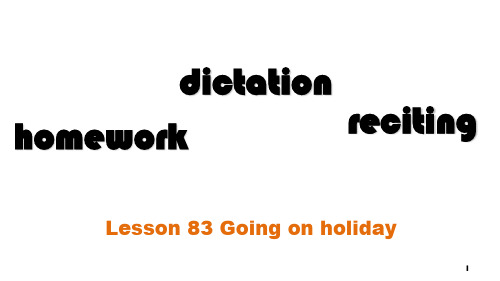
--leave the door open, please. 3)忘带某物
--I left my umbrella on the bus. 4) n. 假期 --sick leave 病假
原形
过去式
过去分词
-make
made
made
-find
found
found
-spend
spent
spent
3)不规则变化(过去分词与过去式不一样)
原形
过去式
过去分词
-take
took
taken
-speak
spoke
spoken
-sing
sang
sung
4)不规则变化(过去分词,过去式,与动词原形一样)
11
leave 1) v. 离开
--It’s time for us to leave. --It’s time for sb. to do… 某人该做某事的时 间到了。
--leave a place for another place --离开….动身去….
--The plane leaves Guangzhou for
10
We are going to leave tomorrow. =We’re leaving tomorrow. 有些动词如:leave, arrive, go, come它们在表示最近的打算、计划 的时候,可以用现在进行时来代替 be going to的形式: 如:I’m coming. He’s arriving tonight.
新概念英语第一册83-84课省一等奖课件_图文

• 8.-Where did you go? -I stayed at home. 一 般现在时(仅仅是谈论过去某时发生的事 )。 • 这里的home是名词,前面用介词at,但不 用加冠词the。 • 而在go home, arrive home中home是地点副 词,所有前面不加介词。
• • • • • • • • •
let’s后面要用动词原形。 let’s 包括对方。例如: Let’s go! Let’s have some tea. let us 不包括对方。例如: Mum, please let us play football. 注意:let’s have some tea, shall we? 我们一起喝茶怎么样? Let us go home, will you? 你回家吧,怎么样?
201d-windy cloud-cloudy sun-sunny Rain-rainy Snow-snowy 在名词的后面+y变为形容词
2018/8/8
• 5.Tom and I are going to have a holiday. • 说两个人的顺序时,一般把别人放在自己之 前,以示尊敬。 • be going to do sth. 一般将来时(表示计划、打 算做某事)。 • have a holiday 度假【回顾】have的用法。 • 6. Aren’t you lucky! 你们可真幸运哪! • 貌似否定疑问句的感叹句。 • 7. I’ve already had my holiday this year. 现在完成 时(画外音:我今年不能再休假了。)
单词学习
• mess /mes/ n. 杂乱,凌乱 • pack/pæ k/ v.包装,打包,装箱 • suitcase/'sju:tkeis/ n. 手提箱 • leave/li:v/ v. 离开 • already/a:l'redi/ adv. 已经
新概念英语NCE_Lesson83-84(共19页)课件

am/is/are + v-ing 2. have lunce吃午餐
- Do you want to have lunch with us? - No,thank you,Tom. - I've already had lunch.
3. want to do sth.想要做某事 我想要买一台新电脑。
leave – left – left leave sp.
他将要离开北京。
He is going to leave Beijing. leave for sp.
他将要去北京。
He is going to leave for Beijing. leave sp. for sp.
他将要离开北京去上海。
He is going to leave Beijing for Shanghai.
ten past two 半点用 half past
3:30
half past three 半点后用to 表达“差几分几点(小时+1)”
5:55
five to six
- Have a cup of coffee then. - I've just had a cup,thank you.
- I had one after my lunch. 7. a cup of 一杯……
I want to buy a new computer. 4. with sb. 和某人一起
我每天早上和Lucy一起上学
I go to school with Lucy every morning.
- I had lunch at half past twelve. 5. at 用于钟点时刻前
新概念英语NCE_Lesson83-84(共20页)课件
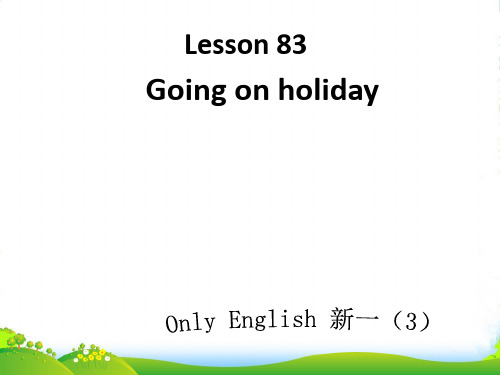
• I haven’t had breakfast. • 你吃早饭了吗?
• Have you had breakfast?
现在完成时态练习题
• 1.We __ just____-(talk) about you. • 2.______you _____(visit) the Great
② v. 挤满,塞满 • 大厅里挤满了影迷。
• The movie fans packed the hall. • 公共汽车里挤满了人。
• The bus is packed with people.
★leave v. 离开 ① v. 离开,出发
• 火车还有5分钟就开了。 • The train is going to leave in 5 minutes.
•
单词学习
• mess /mes/ n. 杂乱,凌乱 • pack/pæ k/ v.包装,打包,装箱 • suitcase/'sju:tkeis/
n. 手提箱 • leave/li:v/ v. 离开 • already/a:l'redi/
adv. 已经
★mess n. 杂乱,凌乱 • 乱七八糟,请原谅。 • Excuse the mess. • The room is in a mess. • 那个房间乱七八糟
• 清理散乱的东西 • clear up the mess • He was such a mess that he did not
know what to do. • 他心乱得不知如何是好
★pack v. 包装,打包,装箱 ① v. 打包,装箱
• pack one’s suitcase 打包 • pack one’s suitcases 收拾行李。
- 1、下载文档前请自行甄别文档内容的完整性,平台不提供额外的编辑、内容补充、找答案等附加服务。
- 2、"仅部分预览"的文档,不可在线预览部分如存在完整性等问题,可反馈申请退款(可完整预览的文档不适用该条件!)。
- 3、如文档侵犯您的权益,请联系客服反馈,我们会尽快为您处理(人工客服工作时间:9:00-18:30)。
★leave v. 离开 ① v. 离开,出发
• 火车还有5分钟就开了。 • The train is going to leave in 5 minutes.
② v. 舍弃;脱离 ③ v. 留给,遗留;委托 • ‘Leave it to me,’he said. • “这事交给我来办吧,”他说道。 • 不要把工作留到明天才做 • Don't leave your work till tomorrow.
可以用现在进行时表将来。
• I’m comi.
现在完成时VS一般过去时
homework
• 整理语法道语法本上并背过。 • 听录音读课文每天1遍(学过的)。 • 抄写L83-84单词和词组2英1 汉 1写。 • 做完L83-84练习册。 • 背诵L83-84课文。 • 预习L85-86,单词8英1汉,读熟。
★pack v. 包装,打包,装箱 ① v. 打包,装箱
• pack one’s suitcase 打包 • pack one’s suitcases 收拾行李。
② v. 挤满,塞满 • 大厅里挤满了影迷。
• The movie fans packed the hall. • 公共汽车里挤满了人。
• 他们已经吃过蔬菜了。
• They have had some vegetables.
• 他们已经吃过蔬菜了 吗?
• Have they had any vegetables?
• 他们没吃早饭呢。
• They have not had any vegetables.
课文讲解
• Have在完成时中,是助动词,无实在意义 • Have还可做实义动词 • 吃早饭 • Have breakfast • 抽根烟 • Have a cigarette • 洗个澡 • Have a bath • 喝杯橙汁 • Have a glass of orange juice
词 • 疑问形式:把 has/have 提前 • 我已经吃过早饭了。
• I have had breakfast. • 我没吃早饭呢。
• I haven’t had breakfast. • 你吃早饭了吗?
• Have you had breakfast?
• Have some beer. • I have had some beer. • Have an apple . • I have had some apples. • Have some milk. • I have had some milk .
Lesson 83
Going on holiday
本课内容
• 单词学习 • 现在完成时 • 课文讲解 • 练习 • 日常用语 • 口语练习 • 作业
• mess • pack • suitcase • leave • already
单词学习
n. 杂乱,凌乱 v. 包装,打包,装箱 n. 手提箱 v. 离开 adv. 已经
• with sb. 和某人一起。
• 我每天早上和Lucy一起上班 • I go to work with Lucy every morning. • 你也跟我们一道来吗? • Will you come with us, too? • Let’s do sth 让我们…… • 我们走 • Let’s go. • 我们开个会吧 • Let’s hold a meeting.
• untidy = messy • tidy-untidy • happy-unhappy • n. + y → adj. 名词词尾加y即构成形容
词:
• wind-windy • cloud-cloudy • sun-sunny
• We’re going to leave tomorrow. • = We’re leaving tomorrow. • 当动词是leave, go, come, arrive等时,
现在完成时
1、含义 (1)在过去一个不确定的时间里发生,并 与现在有着某种联系的动作(强调过去发生 的事对现在的影响)。 (2)开始于过去并持续到现在的动作,也 有可能继续下去。
2、构成 • 肯定句: has/have + 动词的过去分词 • 否定形式:hasn't/haven't + 动词的过去分
★mess n. 杂乱,凌乱 • The room is in a mess. • 那个房间乱七八糟的。 • 乱七八糟,请原谅。
• Excuse the mess. • 清理散乱的东西
• clear up the mess • He was such a mess that he did not
know what to do. • 他心乱得不知如何是好
